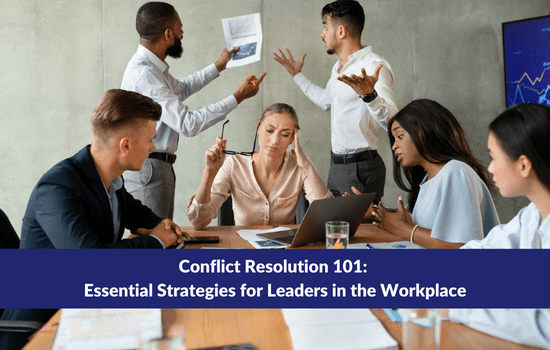Workplace conflict is unavoidable, but how it's managed makes a world of difference. Here are some effective and practical resolution strategies business leaders can use.
Some conflict circumstances require immediate attention from leaders in the workplace. However, allowing team members to work together to find a resolution will develop their problem-solving and team-building skills and strengthen your business.
Workplace Conflict Resolution is Paramount
Addressing and managing conflict is a matter that comes up regularly with my clients; it's a normal part of business management and requires advanced emotional intelligence. Leaders with advanced emotional intelligence know this need in the workplace and must demonstrate empathy and compassion when dealing with conflicting situations.
 Business leaders are responsible for creating a work environment that supports and enables their employees to thrive - intervening when necessary and handling conflict is imperative to maintain a constructive business culture.
Business leaders are responsible for creating a work environment that supports and enables their employees to thrive - intervening when necessary and handling conflict is imperative to maintain a constructive business culture.
What to Avoid During Conflict Resolution:
- Procrastination. Act when resolution is necessary and immediate. Not intervening or ignoring certain situations can significantly intensify the conflict.
- Speaking with individual team members when a group of employees have conflict is not a helpful first step.
- Believing the only people affected by the conflict are the participants. Conflict spreads negative emotional contagion and can create a hostile workplace connecting employees that aren't involved.
Seven Steps to Mediate Conflicts in the Workplace
When teams or individuals struggle to manage in the workplace, I recommend using a framework to work through the conflict resolution process.
- Meet together with team members.
- Ask each member to briefly summarize their point of view (without interruption or personal attacks).
- This short conversation should clarify the disagreement and conflicting opinions.
- Ask each member to describe the actions they'd like the other party to take to resolve the conflict.
- Reinforce the need to communicate with emotions in check.
- Suggest they share no more than 2-3 recommendations.
- Leadership Self-Reflection
- Sometimes, leaders must take some or all of the responsibility for the situation to help employees resolve workplace conflict.
- Leaders, ask yourself, "What about the situation is causing these team members to fail?"
- If the situation needs further exploration, use a process adapted from Stephen Covey - ask participants to share what the other employees can do to remedy the situation.
- Specifically, they need to identify what the other employee can do more and less of and list what they can stop and start doing.
- All team members need to be part of the discussion and commit to making the changes necessary to resolve the conflict.
- You can start by setting these expectations with team members:
- Noticing and acknowledging the other person has made a change, no matter how small.
- Treating each other with dignity and respect.
- Agreeing to disagree respectfully.
- Not allowing personality conflicts to affect the workplace.
- You can start by setting these expectations with team members:
- Inform participants that you expect employees to resolve conflict proactively as adults by:
- Stating you will not choose sides.
- Reinforcing, you will only intervene if the team members have met and cannot resolve the issue.
- Sharing that a person external to the conflict may provide advice, but they don’t know the truth of the matter unless they are directly involved.
- Emphasizing disciplinary action will occur if the team cannot resolve the issue.
- Reassure both parties of your faith in their ability to resolve their differences by:
- Assure they have the skills to work together to resolve their differences; the process will strengthen their relationships and positively impact the business.
- Demonstrate your appreciation and encourage them to continue contributing successfully to your workplace.
- Set a time to review progress.
Without a doubt, a leader's ability to effectively and efficiently manage conflict resolution will profoundly affect the culture and overall productivity of the business. Start today by reflecting and practising the steps above consistently in your workplace. It will make a monumental difference in your leadership skills and your team's resolution skills. Connect with me for support to develop these skills; discover my consulting opportunities and emotional intelligence assessments and training.
This article was originally published on October 14, 2017, and has been updated (August 2023).
More Motivational Reads Here »
How Emotionally Intelligent Are You?
Sign up for Linda's monthly tips to build your Emotional Intelligence and reduce Emotional Hijacking!

















